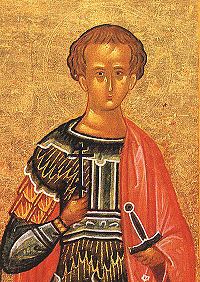Polyeuctes
Polyeuctus
Roman/Armenian martyr and saint (died 259)
Saint Polyeuctus (also Polyeuctes, Polyeuktos, Greek: Πολύευκτος) of Melitene (died 10 January 259) was an ancient Roman saint. Christian tradition states that he was a wealthy Roman army officer who was the first martyr in Melitene, Armenia, under Valerian.[1]
This article needs additional citations for verification. (January 2021) |
Symeon Metaphrastes writes that, moved by the zeal of his friend Saint Nearchus, Polyeuctus had openly converted to Christianity. "Enflamed with zeal, St Polyeuctus went to the city square, and tore up the edict of Decius which required everyone to worship idols. A few moments later, he met a procession carrying twelve idols through the streets of the city. He dashed the idols to the ground and trampled them underfoot."[1]
He was tortured by the authorities and ignored the tears and protestations of his wife Paulina, his children, and his father-in-law. He was beheaded.[citation needed]
